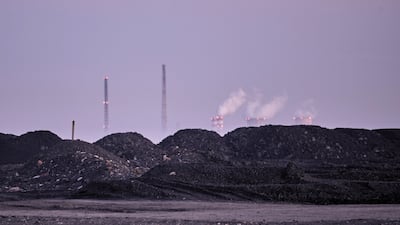Global investors view climate change as the biggest threat that can severely impact the environment, the health of the global population and businesses around the world, a study has found.
As investors continue to negotiate with and navigate an “increasingly complex international investment landscape" to invest and build a sustainable future, digital technology has emerged as the greatest opportunity to advance the well-being of humanity, the Megatrends Study, jointly commissioned by Abu Dhabi’s Mubadala Investment Company and Bloomberg Media, said.
Together, digital technology and climate change are the two megatrends that will play the “biggest roles in defining our future”, the study said. More than 1,800 global investors, millennials and Generation Z consumers from the UAE, the UK, the US, China, France and India were surveyed.
About 52 per cent of respondents from France, 50 per cent from the UK, 41 per cent from the UAE and 39 per cent in India “most strongly” agree that climate change is the biggest threat.
In the US, 29 per cent and 27 per cent in China view climate change almost on par with the impact of demographic shifts and inequalities, the other two mega trends identified in the report.
About 93 per cent of those polled in the UAE and 92 per cent in India called for a transition to a low-carbon economy to counter climate change.
On Wednesday, Dr Sultan Al Jaber, Cop28 President-designate, said the world had only a “small window” of opportunity to make a major course correction in the race to limit temperature rises to 1.5°C above pre-industrial levels.
Global policymakers must collectively act now to ensure the energy transition is swift, Dr Al Jaber, who also serves as the UAE Minister of Industry and Advanced Technology, said at the Berlin Energy Transition Dialogue conference.
The UAE is hosting the Cop28 climate summit this year. The global conference is expected to bring together 70,000 participants from 198 countries when it begins on November 30 at Expo City Dubai.
Digital technology is the most likely megatrend to advance the well-being of the world, with 34 per cent of respondents, each in the US and India, 32 per cent in China and 31 per cent in the UAE supporting it.
Businesses were singled out by 95 per cent of those polled in India as the segment that is expected to “help lead the way to the future”, with 91 per cent in the UAE feeling most strongly about it, followed by 85 per cent in the US, 84 per cent each in France and the UK, and 81 per cent in China, according to the study.
“As a responsible investor, Mubadala continues to execute our investment strategy in line with our convictions about how trends are shaping the world,” said Ahmed Al Calily, chief strategy and risk officer at Mubadala.
“We are investing in the energy transition, traditional and digital infrastructure, life sciences and technology to achieve value creation while delivering a positive impact to communities and contributing to a sustainable future.”
The Megatrends Study follows the publication of a report by the UN Economist Network, which focused on five megatrends — climate change; demographic shifts, particularly population ageing; urbanisation; the emergence of digital technology; and inequality.
Respondents to the Mubadala and Bloomberg Media survey in all markets agree that these megatrends are important to achieving a sustainable future both today and in 2030.
However, while most markets feel optimistic about the current state of megatrends, especially digital technology, investors across the board are more optimistic than either millennials or Gen Z.
“For instance, investors (91 per cent) feel more empowered to respond to megatrends through their choices than either Gen Z (77 per cent) or Millennials (73 per cent),” the report said.
Respondents strongly agree that inequality affects the economy, society and the political environment. They also agreed that urbanisation also brings significant economic and social advantages and disadvantages.
However, those polled were mixed on the impact on quality of life of demographic shifts.
While respondents in India and the UAE felt that most strongly at 93 per cent and 91 per cent, respectively, those in France and the UK rated the impact lower at 82 per cent and 79 per cent, respectively.
Mubadala, Abu Dhabi’s sovereign investment arm, is at the heart of the emirate’s efforts to diversify its economy.
In recent months, Mubadala has announced several deals in line with its investment convictions, including its October 2022 acquisition of a 100 per cent interest in Skyborn Renewables.
The deal alongside Global Infrastructure Partners gives access to the largest private offshore wind developer globally with a long track.
In April last year, Mubadala and BlackRock Real Estate took a stake in Tata Power Renewable Energy for $525 million to support India’s energy independence and transition.
Mubadala’s interest in renewable energy spans more than 15 years. Its subsidiary, Masdar, which is active in more than 35 countries across six continents, has interests ranging from the world’s largest single-site solar power plant in the UAE to Indonesia’s first floating solar power plant.
Mubadala’s recent partnership with Adnoc and Abu Dhabi National Energy Company, better known as Taqa, and Masdar at the end of 2022 aims to create a global clean energy powerhouse by propelling Masdar’s renewable power capacity to 100 gigawatts.


